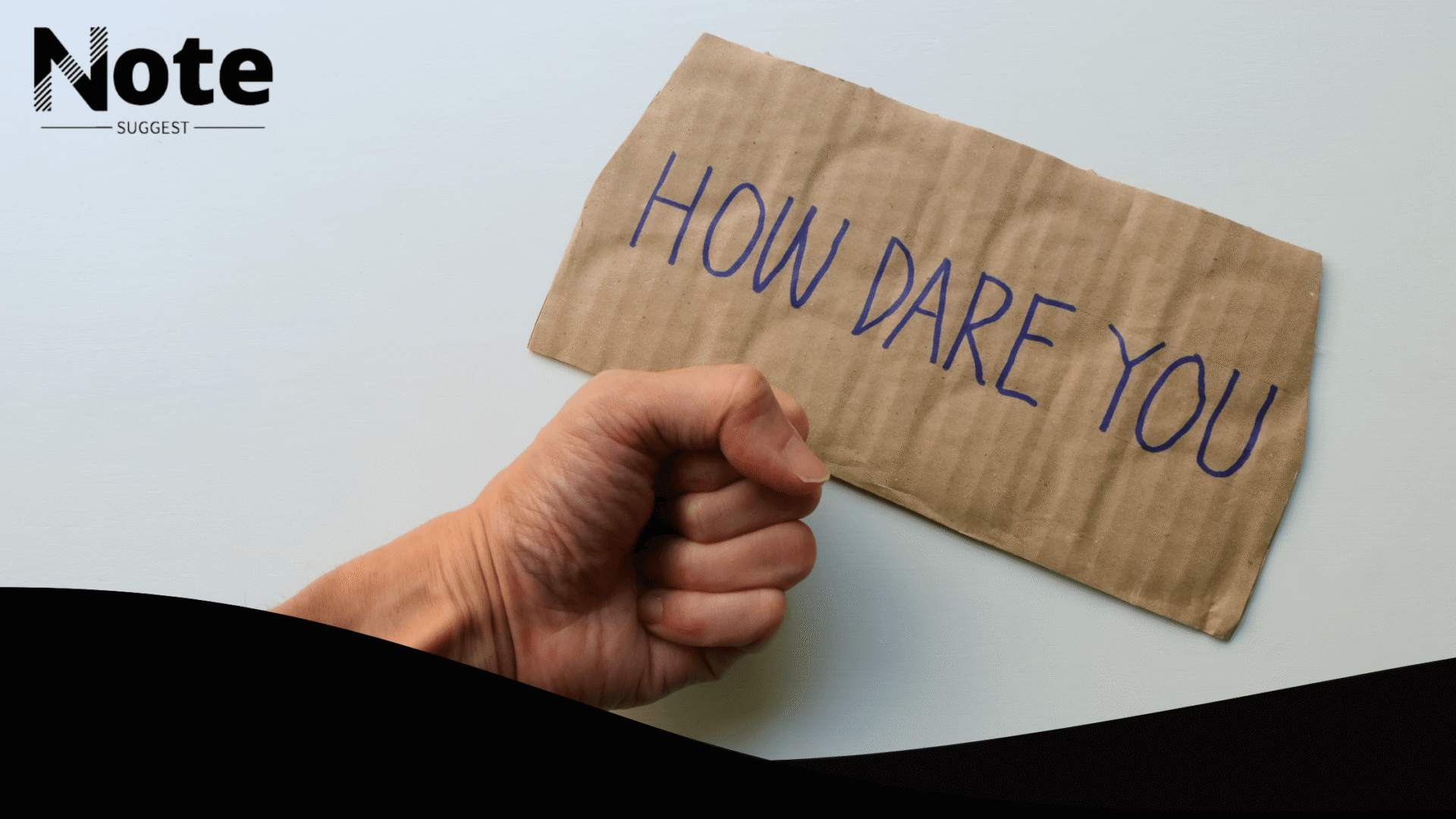
“How Dare You” is a strong way to express shock, anger, or disbelief when someone crosses a line. While it gets the point across, it can sound a bit harsh. Thankfully, there are many other ways to say this that can still show your feelings without sounding too intense. In this article, we’ll explore 15 different phrases you can use instead of “How Dare You.”
These alternatives range from funny to serious, depending on the situation. Whether you’re upset with a friend or a coworker, there’s a way to express your feelings without making things worse.
Using different phrases can also make your conversations more interesting and fitting for the moment. Whether you need something casual or a bit more formal, these options help you communicate your surprise or frustration in a way that suits the situation. Let’s look at some of these alternatives and see how they work in real life.
Contents
- 1 Is It Professional Way to Say “How Dare You”
- 2 15 alternative ways to say “How dare you”
- 2.1 1. Who Do You Think You Are?
- 2.2 2. What Gives You the Right?
- 2.3 3. How Could You Be So Audacious?
- 2.4 4. What Were You Thinking?
- 2.5 5. How Could You?
- 2.6 6. What Nerve!
- 2.7 7. How Could You Be So Bold?
- 2.8 8. What Audacity!
- 2.9 9. Who Gave You the Authority?
- 2.10 10. How Could You Be So Presumptuous?
- 2.11 11. What Makes You Think You Can Do That?
- 2.12 12. How Dare You?
- 2.13 13. Who Do You Think You Are to Act Like That?
- 2.14 14. What Makes You So Confident?
- 2.15 15. How Could You Be So Shameless?
- 2.16 Conclusion
- 2.17 FAQS
- 2.17.1 Is it correct to say “how dare you”?
- 2.17.2 What is “how dare you”?
- 2.17.3 Who said “How dare you”?
- 2.17.4 What do you mean by “I dare you”?
- 2.17.5 What can I say instead of “how dare you”?
- 2.17.6 How dare you quote?
- 2.17.7 Is “how dare you” a question?
- 2.17.8 How do you use dare?
- 2.17.9 How dare you meaning translate?
- 2.17.10 Is “how dare you” a rhetorical question?
Is It Professional Way to Say “How Dare You”
Saying “How Dare You” in a professional setting is generally not advisable. It can come across as too harsh and confrontational, which might escalate a situation rather than resolve it. In the workplace, maintaining a respectful tone is crucial, even when expressing frustration or disagreement. A more professional approach would be to use language that communicates your feelings without sounding accusatory or disrespectful.
Instead of directly saying “How Dare You,” consider using phrases like “I’m surprised by your actions” or “I’m disappointed in this approach.” These alternatives convey your feelings while keeping the conversation polite and constructive. It’s important to address the issue calmly, focusing on the behavior or situation rather than attacking the person. This helps maintain professionalism while still addressing your concerns.
15 alternative ways to say “How dare you”
- Who do you think you are?
- What gives you the right?
- How could you be so audacious?
- What were you thinking?
- How could you?
- What nerve!
- How could you be so bold?
- What audacity!
- Who gave you the authority?
- How could you be so presumptuous?
- What makes you think you can do that?
- How dare you?
- Who do you think you are to act like that?
- What makes you so confident?
- How could you be so shameless?
>> Related Guide: 15 Other Ways to Say “Thanks For Your Interest” (With Scenarios)
1. Who Do You Think You Are?

In a world full of expectations and societal norms, we often face criticism when we step outside of those boundaries. The phrase “Who do you think you are?” challenges someone’s audacity to act in a way that seems out of place or overconfident. It’s typically used when someone displays behavior that feels arrogant or presumptuous, as if they are above others.
Scenario: During a meeting, one colleague proposes a bold change to the company structure without consulting anyone. This sudden assertion of authority catches everyone off guard.
| Question | Situation |
| Who do you think you are? | A colleague suggesting radical changes without prior discussion. |
| What led to this behavior? | Overconfidence and lack of consultation. |
| How did others react? | Confusion, hesitation, and discomfort. |
2. What Gives You the Right?
This phrase typically emerges when someone takes an action or makes a decision without apparent justification. It questions the basis or authority behind someone’s behavior, often used when an individual seems to act outside their role or expertise.
Scenario: A team member from another department starts making decisions about a project they aren’t involved in, leading to resentment from the actual team working on it.
| Question | Situation |
| What gives you the right? | A colleague intervening in a project they aren’t involved in. |
| Why was it questioned? | Lack of involvement and authority in the project. |
| How did others respond? | Surprise, frustration, and a sense of unfairness. |
3. How Could You Be So Audacious?
When someone pushes the boundaries of acceptable behavior or acts in an overly bold way, this question arises. It often indicates disbelief at the extreme or daring nature of someone’s actions, especially if it challenges norms or expectations.
Scenario: At a family gathering, a cousin boldly criticizes your choice of career in front of everyone, making it an uncomfortable moment for all.
| Question | Situation |
| How could you be so audacious? | A family member publicly criticizing your career choice. |
| What motivated this behavior? | A lack of filter and a strong opinion. |
| How did you feel afterward? | Embarrassed, hurt, and shocked. |
>> Enjoy these helpful notes: It Was a Pleasure Meeting You
4. What Were You Thinking?
This phrase expresses disbelief when someone makes a decision that seems completely irrational or risky. It’s used to call into question the logic behind an action, especially when it leads to negative consequences.
Scenario: A friend impulsively buys a car without fully considering their financial situation, leaving them struggling to make payments.
| Question | Situation |
| What were you thinking? | A friend buying a car impulsively without proper planning. |
| Why is it questioned? | Poor financial planning and impulsive decision-making. |
| How did the friend react? | Regret and stress over the car payments. |
5. How Could You?
This phrase typically expresses surprise or disbelief when someone does something shocking or unexpected. It often implies a moral judgment and suggests that the action was wrong or inconsiderate.
Scenario: A colleague accidentally reveals a personal secret in front of the entire team, leaving the person exposed and embarrassed.
| Question | Situation |
| How could you? | A colleague sharing a personal secret without consent. |
| Why was it inappropriate? | It violated trust and caused discomfort. |
| How did the other person feel? | Humiliated and betrayed. |
>> Explore these useful insights: This Quote Shows
6. What Nerve!
This expression is used when someone displays boldness or behavior that seems out of place, often with a sense of disrespect or overconfidence. It’s a reaction to someone who seems to have exceeded their boundaries or limits.
Scenario: A coworker asks for a raise just weeks after joining the company without demonstrating any exceptional performance.
| Question | Situation |
| What nerve! | A coworker requesting a raise too soon after starting. |
| Why was this questioned? | The request seemed premature and lacking merit. |
| How did others respond? | Shock, disbelief, and a sense of awkwardness. |
7. How Could You Be So Bold?

Used when someone acts with surprising confidence or assertiveness, this phrase indicates admiration or disbelief. It’s often asked when someone does something courageous but out of character or context.
Scenario: A new employee challenges a senior manager’s opinion in a meeting, offering a completely different approach to a problem.
| Question | Situation |
| How could you be so bold? | A new employee confidently challenging a senior manager. |
| Why was this bold? | The employee lacked experience and was confronting authority. |
| How did the senior manager react? | Shock and a reconsideration of the idea. |
8. What Audacity!
This expression shows shock at someone’s audacity to do something that seems especially brazen or disrespectful. It’s used when someone’s actions are so unexpected or daring that it feels over the top.
Scenario: A friend borrows a large sum of money from you and then spends it on luxury items without any plans to repay you soon.
| Question | Situation |
| What audacity! | A friend borrowing money and spending it frivolously. |
| Why is this audacious? | The lack of consideration for repayment and your generosity. |
| How did you feel? | Betrayed and taken advantage of. |
>> Discover more helpful guides: I Hope You Feel Better
9. Who Gave You the Authority?
This question is directed at someone who assumes control or influence without having the qualifications or permission to do so. It challenges the legitimacy of their actions.
Scenario: A teammate starts dictating the schedule for a project without consulting anyone on the team, creating frustration among everyone.
| Question | Situation |
| Who gave you the authority? | A teammate making decisions without consulting others. |
| Why was this questioned? | The lack of approval from team members. |
| How did the team respond? | Resistance and frustration. |
10. How Could You Be So Presumptuous?
This phrase questions someone’s assumption of entitlement or their overconfidence in assuming something without permission or proof. It indicates a misstep in social or professional understanding.
Scenario: A colleague assumes they can use your office space for a meeting without asking, assuming you’ll be fine with it.
| Question | Situation |
| How could you be so presumptuous? | A colleague using your office without permission. |
| Why was it presumptuous? | It was an uninvited assumption of ownership or entitlement. |
| How did you react? | Annoyance and a request for boundaries to be respected. |
11. What Makes You Think You Can Do That?
This phrase is used to challenge someone’s confidence or authority, especially when they are stepping out of line or acting beyond their capabilities.
Scenario: A junior employee takes credit for a successful project without acknowledging the team’s effort.
| Question | Situation |
| What makes you think you can do that? | A junior employee taking undue credit for a project. |
| Why was it questioned? | The lack of recognition for others involved in the success. |
| How did the team feel? | Frustrated and undervalued. |
>> Explore these practical ideas: Please Disregard My Previous Email
12. How Dare You?
This phrase expresses extreme surprise and disapproval. It’s used when someone crosses a clear line of acceptability or respect, often in a very personal or direct way.
Scenario: A friend reads your private text messages without permission, causing a sense of invasion.
| Question | Situation |
| How dare you? | A friend invading your privacy by reading your texts. |
| Why was this action inappropriate? | It was a violation of trust and privacy. |
| How did you react? | Anger and a desire to set clear boundaries. |
13. Who Do You Think You Are to Act Like That?
This phrase often appears when someone behaves in a way that seems disrespectful or overly confident, without regard for others. It’s a direct challenge to their behavior.
Scenario: A customer at a store demands special treatment, despite not following store policies, embarrassing the staff in the process.
| Question | Situation |
| Who do you think you are to act like that? | A customer demanding special treatment without justification. |
| Why was it inappropriate? | The behavior was disruptive and unreasonable. |
| How did the staff respond? | Embarrassment, discomfort, and frustration. |
14. What Makes You So Confident?
This question is often asked when someone displays an unusual level of assurance or certainty, particularly when the situation doesn’t warrant such confidence.
Scenario: A new employee confidently gives advice to a senior leader during a company-wide meeting, despite having limited experience.
| Question | Situation |
| What makes you so confident? | A new employee giving unsolicited advice to a senior leader. |
| Why was it surprising? | The disparity in experience and the boldness of the action. |
| How did the leader react? | Surprised, but open to hearing the perspective. |
>> Peruse these helpful guides: Lacking Clarity
15. How Could You Be So Shameless?

This expression conveys a deep sense of astonishment at someone’s behavior that lacks any form of shame or self-awareness, often in a situation where they should feel guilty or embarrassed.
Scenario: A colleague takes full credit for a project they barely contributed to, ignoring the team’s hard work.
| Question | Situation |
| How could you be so shameless? | A colleague claiming credit for others’ work. |
| Why was it shameless? | The lack of acknowledgment or gratitude toward the team. |
| How did the team react? | Anger, frustration, and feelings of betrayal. |
Conclusion
There are many ways to express shock or frustration without using harsh phrases like “How Dare You.” These alternatives allow you to communicate your feelings while keeping the tone suitable for the situation. Whether you’re dealing with a professional or personal issue, these phrases help you address concerns without being overly intense.
Using these alternatives can make your conversations more respectful and effective. By choosing the right words for the situation, you can express your emotions clearly without escalating the issue. With these 15 phrases, you have plenty of options to choose from when you need to address something that shocks or bothers you.
FAQS
Is it correct to say “how dare you”?
Yes, it’s grammatically correct, but it’s often considered harsh or confrontational. It’s used to express shock, anger, or disbelief.
What is “how dare you”?
“How dare you” is an expression used to show anger or surprise when someone does something disrespectful or unexpected.
Who said “How dare you”?
The phrase is commonly used by many, but its origin is unclear. It’s often found in literature, movies, and casual speech.
What do you mean by “I dare you”?
“I dare you” means challenging someone to do something, often implying courage or boldness in taking action.
What can I say instead of “how dare you”?
Instead of “how dare you,” you can say “What gives you the right?” or “Who do you think you are?” depending on the situation.
How dare you quote?
A “How dare you” quote expresses surprise or disbelief at someone’s actions, often in an intense or dramatic way.
Is “how dare you” a question?
Yes, it is a question, but it’s usually rhetorical and doesn’t require an answer. It’s used to show disbelief or shock.
How do you use dare?
“Dare” is used to challenge someone to do something or to express boldness or defiance, such as “I dare you to speak up.”
How dare you meaning translate?
“How dare you” translates to questioning someone’s right or audacity to do something perceived as disrespectful or shocking.
Is “how dare you” a rhetorical question?
Yes, “how dare you” is typically a rhetorical question used to express strong emotions without expecting an actual response.

